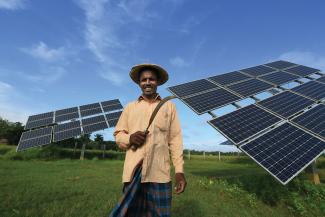In collaboration with the Government of Bangladesh and the private sector, USAID is accelerating sustainable, clean energy solutions in Bangladesh in alignment with the United States Government’s Clean EDGE Asia Initiative and the USAID Climate Strategy, which outlines the commitment to reducing greenhouse gas emissions, promoting sustainable development, and building resilience to the impacts of climate change.
Promoting Advanced Energy Technologies
USAID’s approach to energy development in Bangladesh emphasizes the promotion of clean energy sources and the reduction of greenhouse gas emissions. The Clean EDGE Asia Initiative accelerates the adoption of clean energy solutions with a focus on solar, wind, and energy efficiency technologies, building on past USAID investments in Bangladesh.
Strengthening Energy Institutions
USAID has played a critical role in establishing prominent energy institutions like the Bangladesh Rural Electrification Board and Bangladesh Energy Regulatory Commission, which have expanded electricity connections across the country. Today, USAID builds on this legacy by promoting clean energy markets and fostering public-private collaborations to leverage new resources and expertise. USAID is working with government agencies, private sector partners, and civil society organizations to modernize the country’s power utilities with a focus on strengthening planning, improving financial and operational performance, and enhancing overall quality and reliability across the energy sector.
Attracting Clean Energy Investment
Increased competition and improved market structures are needed to improve efficiency, transparency, accountability, and financial viability of the energy sector while enabling increased private sector investments. USAID is introducing competitive procurement mechanisms like reverse auctions that can secure lower electricity prices and increase transparency in the energy sector.
Enhancing Private Sector Engagement
Increased private sector engagement drives innovation and reduces dependency on government resources to develop the infrastructure needed to transition to clean energy. USAID formed a private sector working group with power project developers, local banks, financial institutions, and energy companies to collaborate in developing clean energy solutions. USAID assistance is piloting clean energy technologies and connects local developers with international experts. We also promote more conducive policies for expanding clean energy.
Boosting Regional Energy Trade
USAID investments promote cross-border energy trade to and from Bangladesh to enhance energy security, generate revenue, create jobs, and advance economic growth. USAID is supporting the Government of Bangladesh to develop a strategy for large-scale, low-cost electricity, while strengthening transmission and operational capacity.
Resources

Mahfuzul Bhuiyan
